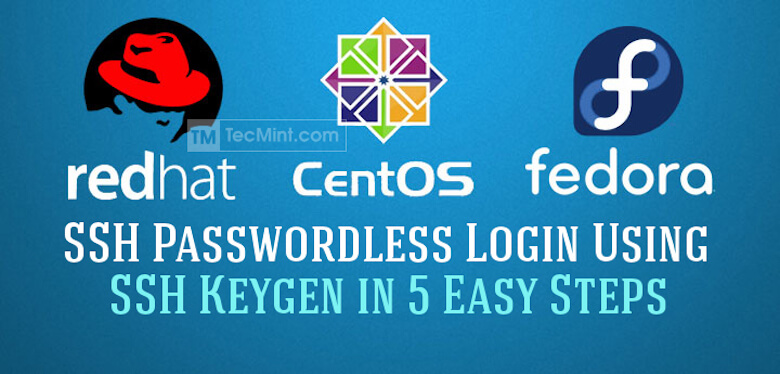SSH Passwordless Login Using SSH Keygen in 5 Easy Steps
| 첨부 '1' |
|
|---|

SSH (Secure SHELL) is an open source and most trusted network protocol that is used to login into remote servers for execution of commands and programs. It is also used to transfer files from one computer to another computer over the network using secure copy (SCP) Protocol.
In this article we will show you how to setup password-less login on RHEL/CentOS 7.x/6.x/5.x and Fedora using ssh keys to connect to remote Linux servers without entering password. Using Password-less login with SSH keys will increase the trust between two Linux servers for easy file synchronization or transfer.
My Setup Environment
If you are dealing with number of Linux remote servers, then SSH Password-less login is one of the best way to automate tasks such as automatic backups with scripts, synchronization files using scp and remote command execution.
In this example we will setup SSH password-less automatic login from server 192.168.0.7 as user picomax to 192.168.1.240 with user hooni.
Step 1: Create Authentication SSH-Kegen Keys on – (192.168.0.7)
First login into server 192.168.0.7 with user picomax and generate a pair of public keys using following command.
Step 2: Create .ssh Directory on – 192.168.1.240
Use SSH from server 192.168.0.7 to connect server 192.168.1.240 using hooni as user and create .ssh directory under it, using following command.
Step 3: Upload Generated Public Keys to – 192.168.1.240
Use SSH from server 192.168.0.7 and upload new generated public key (id_rsa.pub) on server 192.168.1.240 under hooni‘s .ssh directory as a file name authorized_keys.
Step 4: Set Permissions on – 192.168.1.240
Due to different SSH versions on servers, we need to set permissions on .ssh directory and authorized_keys file.
Step 5: Login from 192.168.0.7 to 192.168.1.240 Server without Password
From now onwards you can log into 192.168.1.240 as hooni user from server 192.168.0.7 as picomax user without password.
[출처] https://www.tecmint.com/ssh-passwordless-login-using-ssh-keygen-in-5-easy-steps/
| 번호 | 분류 | 제목 | 글쓴이 | 날짜 | 조회 수 |
|---|---|---|---|---|---|
| » | System/OS |
SSH Passwordless Login Using SSH Keygen in 5 Easy Steps
|
hooni | 2019.11.22 | 1523 |
| 176 | System/OS |
How to Install and Use wget on Mac
|
hooni | 2020.09.03 | 1513 |
| 175 | Etc |
아이폰의 터치스크린 정확도
|
hooni | 2015.04.01 | 1500 |
| 174 | Develop | [ios] Swift 4 String, Date, DateFormatter 예제 | hooni | 2018.10.18 | 1497 |
| 173 | System/OS |
RPA란? 어디에 어떻게 쓰이고 누가 만드나?
|
hooni | 2020.01.28 | 1488 |
| 172 | System/OS |
Configure Postfix to Use Gmail SMTP on Ubuntu 18.04
|
hooni | 2020.02.07 | 1480 |
| 171 | Develop | [ios] How to set up clang formatter | hooni | 2015.09.17 | 1461 |
| 170 | Etc |
모바일 프로그래머가 갖추어야 할 필수 역량
|
hooni | 2017.02.16 | 1445 |
| 169 | Develop | [android] 간단한 SQLIite 예제 | hooni | 2017.06.14 | 1441 |
| 168 | System/OS |
[mac] Mac OS 패키지 매니저, HomeBrew
|
hooni | 2015.01.03 | 1440 |
| 167 | Etc |
ISMS 인증기준 – 정보보호대책 (시스템개발보안)
|
hooni | 2016.12.01 | 1437 |
| 166 | Develop | [php] 한글 문자열 자르기 (utf-8) | hooni | 2015.11.10 | 1437 |
 [swift] popToRoot 모달뷰, 네비게이션컨트롤러 한꺼번에 닫기
[swift] popToRoot 모달뷰, 네비게이션컨트롤러 한꺼번에 닫기
 How to Install and Use wget on Mac
How to Install and Use wget on Mac